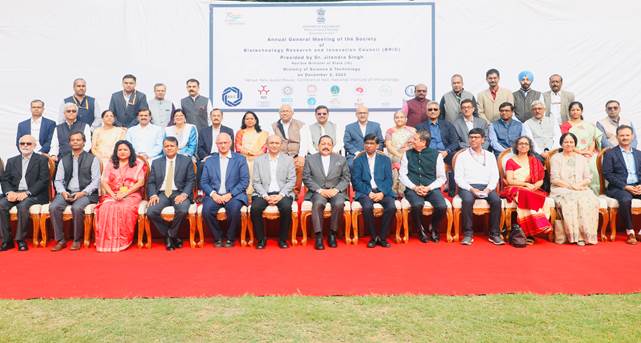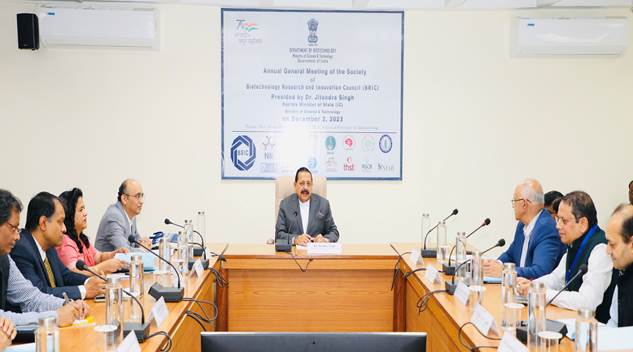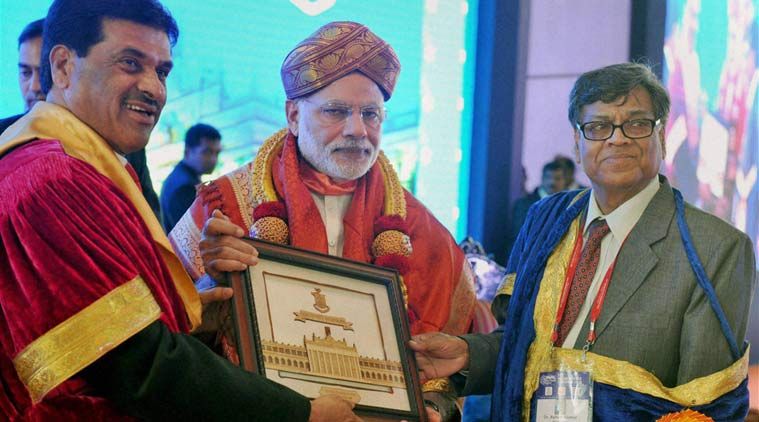By — Shyamal Sinha
Addressing the first-ever meeting of the BRIC Society after its registration on 10th November, 2023 after getting the Cabinet approval, Union Minister of State (Independent Charge) Science & Technology; MoS PMO, Personnel, Public Grievances, Pensions, Atomic Energy and Space, Dr Jitendra Singh said here today that time has come for defining “Bio-vision” for Bharat.
Dr Jitendra Singh today said that the new Apex Autonomous Society called Biotechnology Research and Innovation Council (BRIC) will fulfil Prime Minister Narendra Modi’s Vision for Atma Nirbhar Bharat in areas like healthcare, food and energy needs by scaling biotech research and innovation.
Dr Jitendra Singh said, Indian Bio-economy recorded 13 times increase in the last ten years.
The Minister quoted PM Modi as saying, “India is not too far from reaching the league of top-10 countries in Biotech’s global ecosystem”. He added that BRIC is going to be a testimony to this and again by inculcating the spirit of Sabka Prayas, the government is bringing together the best minds on a unified platform.
Dr Jitendra Singh informed that the Department of Biotechnology (DBT), Ministry of Science and Technology is functioning as the nodal agency for promotion of Biotechnology in the country. It was accorded the Cabinet approval for rationalization of its 14 Autonomous Institutions (AIs) by subsuming them under one Apex Autonomous Society viz. Biotechnology Research and Innovation Council (BRIC), for centralized and unified governance to maximize impact of biotech research across the country.
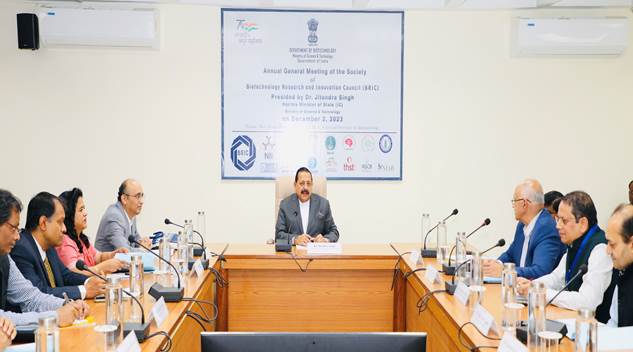
Dr Jitendra Singh described the BRIC meeting as a historical event in India’s Biotech Ecosystem, where elite institutions are consolidating their efforts to impact the biotech R&D ecosystem. He expressed hope that BRIC will prospectively enrich India’s progress in every front including economy and employment. The Minister said, as accomplished institution-builders, he would like to seek their views for defining the Bio-Vision for Bharat in this significant meeting, as they are supposed to bring in tremendous value to this noble mission.
Dr Jitendra Singh also pointed out that this is one of the first Departments in the Government of India to have successfully executed “Rationalization of Autonomous Bodies” for process and performance enhancement of its Autonomous bodies.
Dr Jitendra Singh said, some of the significant changes that will be driven by BRIC include that each of the 14 subsumed BRIC Institutions will maintain their distinct research mandates, governed by one Governing Body, at BRIC. He said, Institutes would be allowed utilization of institutional lab space, not exceeding one third, for researchers from outside DBT institutes and their collaborators (from industry or other institutes) to carry out R&D for start-ups emerging out of institutional research.
Dr Jitendra Singh also underlined that BRIC and its Institutes can engage in public-private research partnerships and receive endowments including funds from non-Governmental resources for research-related activities.
Dr Jitendra Singh also added that new Ph.D programs across BRIC institutions with a common course curriculum at RCB and immersion training for field or experimental studies for validating research hypotheses prior to thesis work. During the Immersion phase (for about 3 months) students will get additional fellowships from Grand Challenges India program. Additionally, to enhance the scientific character of the institutions, additional 120 scientific positions are being brought in. Parity across levels and cadres are also being pursued. Further improving service prospects for scientists are also being taken up, the Minister added.
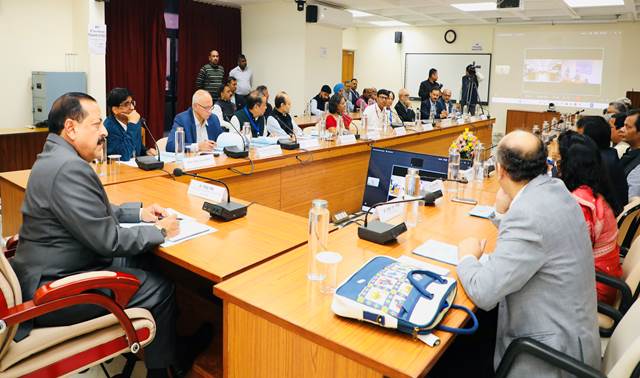
The DBT initiated this restructuring activity as per the directives on “Rationalization of Autonomous Bodies” issued by Department of Expenditure, Ministry of Finance. However, they have used it as an opportunity to introspect and overhaul the way research is conducted across the DBT institutions. It is envisioned to improve governance, efficiency, encourage collaborations through greater interdisciplinary interactions and democratize resources. The compliance to governmental processes and administrative issues will be centrally managed in a coordinated effort thereby achieving “Minimum Government, Maximum Governance”.
The 14 institutes to be governed by the Society of the new Apex Body of BRIC are: :i) National Institute of Immunology (NII, New Delhi); ii) National Center for Cell Science (NCCS, Pune); iii) Institute of Life Sciences (ILS, Bhubaneshwar); iv) Rajiv Gandhi Centre for Biotechnology (RGCB, Thiruvananthapuram); v) Centre for DNA Fingerprinting & Diagnostics (CDFD, Hyderabad); vi) National Brain Research Centre (NBRC, Manesar); vii) National Institute for Plant Genome Research (NIPGR, New Delhi); viii) Institute of Bioresources and Sustainable Development (IBSD, Imphal); ix) National Institute of Animal Biotechnology (NIAB, Hyderabad); x) Institute for Stem Cell Science and Regenerative Medicine (inStem, Bangalore); xi) National Institute of Biomedical Genomics (NIBMG, Kalyani); xii) Translational Health Science and Technology Institute (THSTI, Faridabad); xiii) National Agri-Food Biotechnology Institute (NABI, Mohali); xiv) Center of Innovative and Applied Bioprocessing (CIAB, Mohali). NABI and CIAB have been merged into one administrative unit with one Director.
Dr. Jitendra Singh today also launched the ‘Zero Waste Life on Campus’ program on the occasion of first Society Meeting of BRIC.
The ‘Zero Waste Life on Campus’ program is aimed at achieving sustainability through application and adoption of knowledge and technologies, and promotion of management models focused on co-responsibility, on each BRIC campus. The diverse locations, cultures and climatic conditions of the 13 BRIC campuses will provide an opportunity to understand the benefits and challenges related to recycling technologies and techniques. This program will forge a new direction for research towards integrated waste management by the community at large.
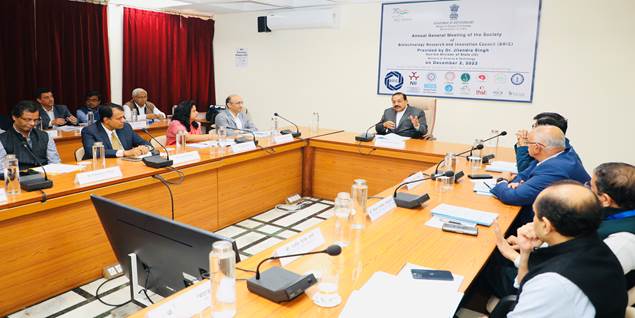
The Minister in his remarks said that this is a people centric movement that will serve as a beacon leading India into sustainable waste management. This programme will strengthen collaborations among all these institutions and also serve a catalyst for other institutions across India to follow the concept of Zero Waste.
This program is aligned with Prime Minister Shri Narendra Modi’s Mission LiFE movement said, Dr Jitendra Singh.
